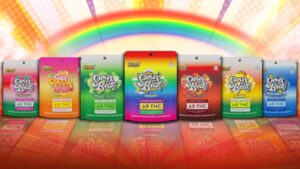CBD comes in many forms that allow the user to enjoy the many benefits of this cannabinoid. One of these forms is called a tincture. A tincture is an oily liquid that is taken sublingually. A tincture is made using CBD extract – either broad or full-spectrum – and an oily liquid known as a CBD carrier oil.
These carrier oils can have many different bases like nuts or plants, which is important if you are allergic to specific foods. Others might have an odd taste or cause a skin reaction if you get some on your skin. In order to understand why CBD is in carrier oils, let’s take a look at carrier oils and which one is the most effective.
What is Carrier Oil & What Does it Do?
A carrier oil is an oil that is made from plants, including coconut, hemp, macadamia nut, and others. Carrier oils help to “carry” the dilated CBD – or any other cannabinoids like CBN, CBG, CBGA, and CBDA – to your skin. It also helps your body to absorb CBD better.
Since CBD is fat-soluble, it is easier to dissolve into an oil base instead of a water base. Thus, allowing your body to digest it easier. As your body digests the fat-soluble CBD, it distributes the CBD to your lymphatic system, a large part of your body’s immune system. Anything not used by your lymphatic system is stored in your fatty tissues and liver for future use.
Using a carrier oil also makes it easier to dose for daily consumption. Measuring out a dropper of CBD-infused oil is much simpler than trying to calculate an exact amount of pure CBD crystalline isolate! In raw form, CBD is so potent that a little goes a long way – especially when used for medicinal purposes.
Lastly, carrier oils have benefits all on their own. Some are lightly scented or unscented and can add to the flavor of the CBD tincture. Someone with tree and nut allergies may prefer an olive oil-based tincture, as opposed to the more popular coconut and macadamia nut oil bases. Whichever oil base you choose, always consult your primary physician before incorporating CBD tinctures into your daily routine.
Common Types of CBD Carrier Oils
Now that we’ve discussed what a carrier oil is and why it’s important, it’s time to go over the popular carrier oils in the CBD industry. There are quite a few options in the CBD industry. But, we’ll highlight which ones are most effective.
Coconut Oil
Coconut oil is a popular carrier oil for CBD, as it is rich in saturated fats and medium-chain triglycerides. While some manufactures use fractionated coconut oil – or MCT oil – as a carrier oil, others prefer straight coconut oil.
Since this oil has very little to no flavor, this is a popular option for CBD tinctures. Coconut oil is also much thinner than other oils used as carrier oils, allowing coconut oil to be measured and dispensed easier. Lastly, coconut oil is naturally anti-inflammatory and antifungal, while also containing antibacterial qualities.
Hemp Seed Oil
Even though CBD is naturally derived from hemp flower, hemp seed oil actually comes from the hemp seed itself. The hemp flower contains more cannabinoids and terpenes, while the seed contains more phytochemicals. Many users prefer hemp seed oil for the “entourage effect”.
The entourage effect is when the combined parts of the plant (flower and seed) deliver a stronger and more effective experience than if only the hemp flower was used. Unfortunately, this particular oil is more expensive and doesn’t hold as much CBD as other carrier oils (like MCT oil). The flavor is often sharper and more herb-flavored. So, be mindful of this if trying hemp-seed oil tinctures for the first time.
MCT Oil
This particular carrier oil is the most popular carrier oil. Also known as “medium-chain triglycerides,” its chemical makeup does not have to be broken down by your digestion system. It is also derived from coconut oil and offers the quickest absorption into your body thanks to its molecular structure. It’s less expensive than other carrier oils and often has a longer shelf-life.
The oil is light and thin, and nearly flavorless. MCT oil is also claimed to aid with weight loss by increasing your metabolism, lowering your appetite, and helping your body burn calories quicker. It has also been known to help people suffering from Alzheimer’s, cancer, autism, type 2 diabetes, and epilepsy. But more scientific research needs to be done before these claims can be verified.
Macadamia Nut Oil
Most people consider macadamia nut oil as a moisturizer and cooking oil, but it can also be used as a carrier oil for CBD. It comes from macadamia nuts that are pressed and refined into a clear light yellow liquid. According to medicalnewstoday.com, this particular carrier oil contains many healthy fatty acids, potassium, and other nutrients. It comes packed with antioxidants that can help the body battling cancer, stress, and aging.
Macadamia nut contains vitamin E that helps the body fight off cardiovascular and neurological diseases, as well as increasing your heart’s health. It can also help your body’s natural skin and hair glow. However, people with nut allergies should be careful when using this particular carrier oil. It is advisable to consult with a doctor before jumping into a macadamia nut-based CBD routine.
Which is the Most Effective CBD Carrier Oil & Why?
According to some manufacturers, unrefined MCT is thought to be the most effective carrier oil for several reasons. Since the body does not have to break MCT oil down before distributing it, your body can absorb the CBD faster and more effectively. MCT also has several powerful properties that are only enhanced by CBD.
MCT contains strong antibacterial properties, can aid in skin health, comes with many other essential fatty acids, and helps enhance cognitive functions. Since MCT oil comes from coconut, be sure to choose the unrefined option, as this option comes from freshly harvested coconut meat and doesn’t go through chemical processing before it is used.
Final Thoughts
Carrier oils aren’t something we give much thought to when consuming a dropperful of CBD tincture. But, they are incredibly important. Different carrier oils offer different benefits and options to those considering adding CBD into their daily routine. CBD is a wonderful homeopathic alternative to pharmaceutical prescriptions.
However, CBD products should not be viewed as a cure-all for your body’s ailments. Some carrier oils are not an option for those with tree and nut allergies, while others may be more expensive and have a shorter shelf life. Whatever CBD carrier oil you choose, make sure to do your research before jumping blindly into a particular option.
There are so many carrier oils available to you, thanks to the growing popularity of the CBD industry! From coconuts to hemp to macadamia nut, the CBD carrier oil industry offers a plethora of benefits that can improve your daily health with just a single dropper.


